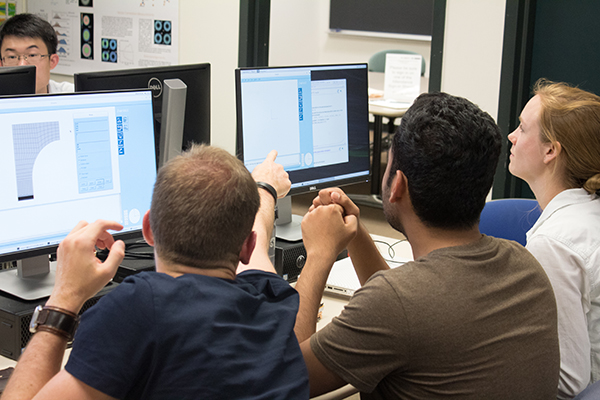
The sixth annual Summer School in Computational Materials Science ( CMS 3 ) was held at Texas A&M University.
CMS 3 hosts graduate students, postdocs, junior faculty, research scientists and engineers from universities and companies around the world. Additionally, the instructors of the school are leaders in their respective fields.
“Topics covered during the program included thermodynamics and kinetics of microstructures, micromechanics of plasticity, fracture and phase transformations, mesoscale modeling, atomistic simulations and elements of materials informatics, and integrated computer-aided materials design,” said Raymundo Arróyave, an organizer of the school and Presidential Impact Fellow in the Department of Materials Science and Engineering.
The program is unique in that it incorporates both theory and practical components for students to carry out computational exercises each day. The main organizer of CMS 3 is Dr. Amine Benzerga, professor in the Departments of Aerospace Engineering and Materials Science and Engineering, and director of the Center for Intelligent Materials and Structures. Co-organizers of this event include Department of Materials Science and Engineering Assistant Professors, Dr. Ankit Srivastava and Dr. Xiaofeng Qian; and Arróyave.
“The purpose of CMS 3 is to provide a highly educational environment for graduate students interested in the area of computational materials science across multiple scales, for faculty and graduate students to exchange ideas and time and a platform to explore the latest advances in materials informatics for materials discovery and design,” Benzerga said.
The Laboratory of Molecular Simulation (LMS), directed by chemistry professor Dr. Michael Hall and managed by associate research scientist, Dr. Lisa Perez, contributes the infrastructure to carry out the practical sessions. Perez coordinates all laboratory sessions.
The students coming from institutions of higher education are provided travel and lodging support which comes from the Center for Intelligent Multifunctional Materials and Structures (CiMMS), the materials science and engineering department at Texas A&M and the National Science Foundation.
This program is jointly organized by CiMMS, the materials science and engineering department and the Data-Enabled Discovery and Development of Energy Materials Program (D3EM).